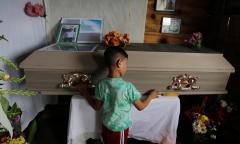
by Jeff Ernst, for The Guardian
Several days after Nelson Espinal slipped across the US southern border, he called his family back in Honduras from inside a US detention center.
“Tell Mom not to worry – I’m applying for asylum,” Espinal, 28, told his sister Patricia, who recounted the December phone call with tears streaming down her sun-scarred cheeks. “We must pray to God that they give it to me. I told them I can’t go back to Honduras because if I go back, they’re going to kill me.”
Espinal had made the 4,900km journey with several thousand others who joined the migrant caravan in October in the hopes of starting a new life.
Within weeks of reaching the US, however, he was deported back to his gang-infested neighborhood in the Honduran capital Tegucigalpa – and the death threats that had prompted him to flee.
He resolved to try his luck again in the new year: head north, save his life and find a way to help his family and provide for his seven-year-old son.
But just over a week after his return, Nelson was shot dead on the street outside his home on 18 December 2018.
Despite a recent drop in homicide rates in Honduras and neighboring countries, Espinal’s murder is a sharp reminder that for many people in the region, the decision to migrate is one of life or death.
A ruling last June by the then US attorney general Jeff Sessions made it all but impossible for victims of gang violence like Espinal to obtain asylum. And as a new migrant caravan prepares to set off from Honduras on Tuesday, more will probably suffer the same fate.
Espinal lived with his parents, four sisters and son in a rough shack in the José Ángel Ulloa neighborhood. High in the mountains that cup the city centre, the area is dominated by the notorious MS-13 gang.
In cities across Honduras, El Salvador and Guatemala, gangs terrorize residents into submission and recruit young people by force or coercion, promising “work” for youths who have little prospect of finding formal employment – and threatening death for those who refuse.
“When they get their eye on someone, they search them out again and again,” said Patricia Espinal.
The gangs had tried to recruit her brother since he was a teenager, but he had steadfastly resisted. “They’re asking if I want to work with him,” she recalled him saying. “[But] I’d rather have rough hands [from manual labor] than join a gang.”
So when news broke last October that a large group of migrants was planning to head north from the city of San Pedro Sula, Espinal and a pair of friends rushed to join the caravan, calculating that there would be safety in numbers.
It was unprecedented for such a large number to set out together, and Espinal believed the caravan offered the perfect opportunity to escape. In the end, however, the violence that has plagued Honduras for more than a decade proved inescapable.
“In a country as violent as Honduras, many of the people who are forced to migrate do so out of fear of violence – so when they are deported it’s essentially a death sentence,” said Joaquin Mejia, a human rights lawyer, who added that the responsibility lay with the Honduran government for its failure to guarantee the security of its citizens and the US government for not fulfilling its human rights obligations.
Due to the government shutdown, the Guardian was unable to reach US Customs and Border Protection for comment.
Homicide rates in Honduras peaked in 2011 at 86.5 for every 100,000 inhabitants, and have since decreased to 43.6 for every 100,000 inhabitants in 2017, according to the Violence Observatory.
But that still works out to more than 10 murders a day – in a country with a population slightly larger than London – and is still the fourth-highest rate in the Americas.
“In this neighborhood they’ve killed tons of boys,” said Espinal’s mother, Sara Matamoros. “Neighbors and friends.”
Men account for nearly 90% of homicide victims in Honduras. Those between the ages of 20 and 29, such as Espinal, were murdered at a rate of over 160 for every 100,000 inhabitants in 2017.
But no population group escapes the bloodletting.
Women make up a small percentage of victims, but the country’s femicide rate is among the world’s highest. And in 2017, Honduras’s child homicide rate was the highest in the world, according to a report by Save the Children.
Meanwhile, domestic and sexual violence is endemic, but according to the Center for Women’s Rights in Tegucigalpa, remains largely unreported due to structural machismo.
“People don’t migrate [just] because they fancy it, but because they are searching for a new life, a better economic situation. But also, the people migrate out of fear of violence – and that often is not understood by legislators or President Trump,” said Ayestas.
The Honduran government has relied heavily on hardline mano durapolicies, such as the creation of a heavily armed military police, which has patrolled the streets since 2013.
Meanwhile, impunity rates are exceedingly high even for serious crimes; despite a reduced homicide rate, the terror endures.
“Bringing back peace is not just about lowering the homicide rate,” said Ayestas. “Because there are other crimes and the public’s perception of security – which haven’t improved.”
Ayestas and others argue that until Hondurans feel secure in their homes and neighborhoods, they will continue to migrate.
“Here in this country they just kill,” said Matamoros. “They don’t care about the family’s pain.”
That pain was clear in the face of Espinal’s son Yojan, who sat in the family home, staring blankly and clutching a toy car; Nelson bought it as Christmas gift, but didn’t survive long enough to give to him.
According to his family, Yojan has already started talking about leaving home and heading north to escape.
